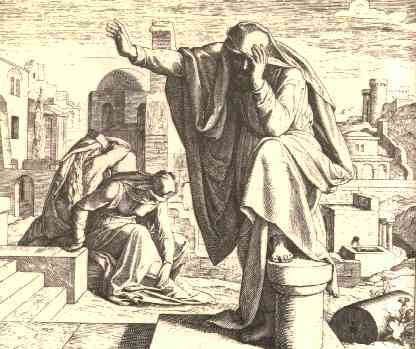
The parasha hits on some dramatic events, principally the military victories over Sihon and Og, but also the conquest of other peoples, armies, nations, and regions up and down the eastern bank of the Jordan River.
- Argob and Bashan are conquered (the Golan region)
- The Wadi Yabbok is taken (the site in present-day Jordan where Jacob wrestled with the angel)
- The Wadi Aroer is taken (just east of the Dead Sea, about halfway down)
The end of the parasha begins to draw a map for us. According to Moses’ history, the Hebrews seized the Aravah Valley from the slopes of Mount Pisgah (parallel to Jericho but on the east side of the rift) to the edge of the Jordan River, and from the Kineret down to the Dead Sea. Moses charges his chalutzim (in modern Hebrew, pioneers, in JPS’ translation, “shock troops”) to enter the land and seize it, which Joshua will in fact do in a short while.
But before all of this action, Moshe has a brief lament. In 1:12, he says the following:
How (eicha) can I bear unaided the trouble of you, and the burden, and the bickering! Pick from your tribes men who are wise, discerning, and experienced, and I will appoint them as your heads.
Moses here is saying two things. First, it’s the troublesome and quarrelsome nature of his people, always at each other’s throats, always complaining, always kvetching, always coming to him with problems. Imagine a frustrated parent, an overwhelmed teacher, a principal besieged by complaints, a referee in soccer who’s in way over his head. Pick your favorite metaphor.
But he’s also acknowledging that one man can’t do it alone. The interesting thing here is that in Shemot, Moses’ father-in-law, Yitro, is given credit for the idea of appointing a system of judges underneath it, but in this week’s parasha, it appears to be Moshe’s idea. There are contrasting opinions about why that is, including a slant from the documentary hypothesis that I particularly like, but that’s not the point.
The point is the word eicha. How? How can Moshe be expected to bear the weight of the people on his shoulders?
The word eicha also opens the Book of Lamentations, read on the fast of Tisha B’Av, which begins on Saturday night.
Eicha! Lonely sits the city, once great with people! She that was among great nations is become like the widow. The princess among states is become a thrall.
Eicha. What does it mean? “Alas” says the new JPS translation. “How”, says the 1917 JPS version. Others suggest “In what way,” “what”, or with some vowel switching, the word becomes ayeka, ”where are you.”
It’s the perfect word for both cases. In Moses’ case:
HOW did I allow the people to continue to be so rebellious and difficult? ALAS, I can’t handle them. IN WHAT WAY could I have acted differently? WHAT did I do to create this situation? WHERE WAS I when this all happened? WHERE AM I as a leader?
And in the case of Lamentations and of Jeremiah:
HOW did this all come to pass? ALAS, the city lies in ruins? IN WHAT WAY did we act to cause this calamity to befall us? WHAT did we do to deserve this? WHAT can we do to begin the healing process? WHERE WERE YOU, God, when this happened? WHERE ARE YOU, God, to deliver us and redeem us?
The Haftarah this week, for Shabbat Chazon, is the third Haftarah of admonition. In case we haven’t been admonished enough yet, Isaiah takes the Jewish people to task again for all manner of sins and iniquities. Yes, we are rebellious children. Yes, our hands are stained with crime. Yes, we will be devoured by the sword if we refuse to obey.
In the middle of the foreboding is another eicha.
Eicha, she has become a harlot, the faithful city that was filled with justice, where righteousness dwelt- but now murderers.
Let’s play with the word eicha again… this time through the lens of Isaiah, viewing the inevitable downward spiral of sinat chinam with what must have been a ruthless combination of fear, loathing, disdain, and hopelessness.
O Jerusalem, a city of wickedness, deviants, defilement, deconstruction, and destruction
HOW did you stray so far from the course of righteousness? ALAS, you will not listen to my message IN WHAT WAY could I have effected real change and teshuva? WHAT can be done to avert the fulfillment of this prophecy? WHERE ARE YOU, God, to make them listen to me, or to give me more powerful words? WHERE ARE YOU, citizens of Jerusalem, when I need you to change course?
The word eicha rings out like an alarm in the readings this morning, just like it will convoke us at Tisha B’Av. There is a despair, an existential cry for help, and an awareness of crisis that we can’t help but read into the word.
This week, as we take stock of recent events around the world, this word should carry added meaning.
If you change the speaker and the setting, eicha or ayeka are questions that must be asked in Damascus as the death toll rises, or in Baghdad, which is seeing its bloodiest week in years.
Eicha can be asked in the aftermath of the horror of Aurora, Colorado.
Eicha can be asked in Bulgaria, with the memory of the recent terror attack still heavy on our minds, or in Ashkelon, where Iron Dome rockets intercepted Grad missiles launched from Gaza.
It’s hard to look around and not ask eicha, how is this all happening at once, or even ayeka, God, where are you as the world is on fire all around us?
Eicha.
HOW do these horrors continue to happen? ALAS, each day carries more bad news. IN WHAT WAY has history, coincidence, fate, hatred, and politics created a moment in time when all of these events have transpired in such a short amount of time? WHAT, if anything can we do to stop them from happening? WHERE ARE YOU, God, when terrible people are doing terrible things?
Jewish history is full of these questions. The tensions between good and evil, between being powerless and having control of your life, and between happiness and suffering have plagued us for millennia.
As we commemorate Shabbat Chazon and Tisha B’av, let’s remember that it’s not always doom and gloom, and that good times almost always follow bad. After we read Eicha on Saturday night, we will begin the process of consolation.
Let us pray that the horror of the past two weeks will subside, and be replaced by a time of peace, healing, and happiness in every corner of the earth.
This post has been contributed by a third party. The opinions, facts and any media content are presented solely by the author, and JewishBoston assumes no responsibility for them. Want to add your voice to the conversation? Publish your own post here. MORE


